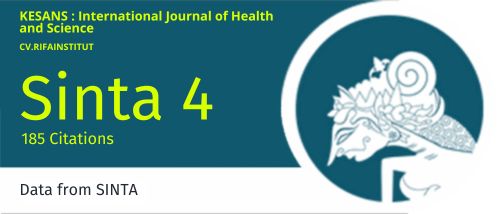The Relationship of Knowledge, Attitudes, and Peer Support to the Prevention of Risky Sexual Behavior in Students at SHS 1 Subang
DOI:
https://doi.org/10.54543/kesans.v5i1.394Keywords:
Reproductive Health, Risky Sexual Behaviors, Knowledge, Attitudes, Peer SupportAbstract
Introduction: Adolescents are a vulnerable group to risky sexual behaviors due to a lack of understanding of reproductive health. Objective: To determine the relationship between knowledge, attitudes, and peer support and risky sexual behavior in adolescents at SHS 1 Subang. Methods: The study used a quantitative method with a cross-sectional design and a correlational approach. A sample of 87 respondents was selected through the proportionate stratified random sampling technique. Results and Discussion: The results of the analysis using the Spearman Rank Corelation test showed that there was a significant relationship between knowledge (r 0.407; p-value < 0.001 (p < 0.05), attitude (r 0.310; p-value 0.003 (p < 0.05), and peer support (r 0.413; p-value < 0.001 (p < 0.05) with risky sexual behavior. Conclusion: Knowledge, attitudes, and peer support have an important role in shaping adolescent sexual behavior, in accordance with the Precede-Proceed Model theory which states that behavior is influenced by predisposing and reinforcing factors.
Downloads
Published
How to Cite
Issue
Section
Citation Check
License
Copyright (c) 2025 Reynaia Putri, Fitri Handayani, Eva Riantika Ratna Palupi, M. Iqbal Angga Kusuma

This work is licensed under a Creative Commons Attribution-ShareAlike 4.0 International License.





















